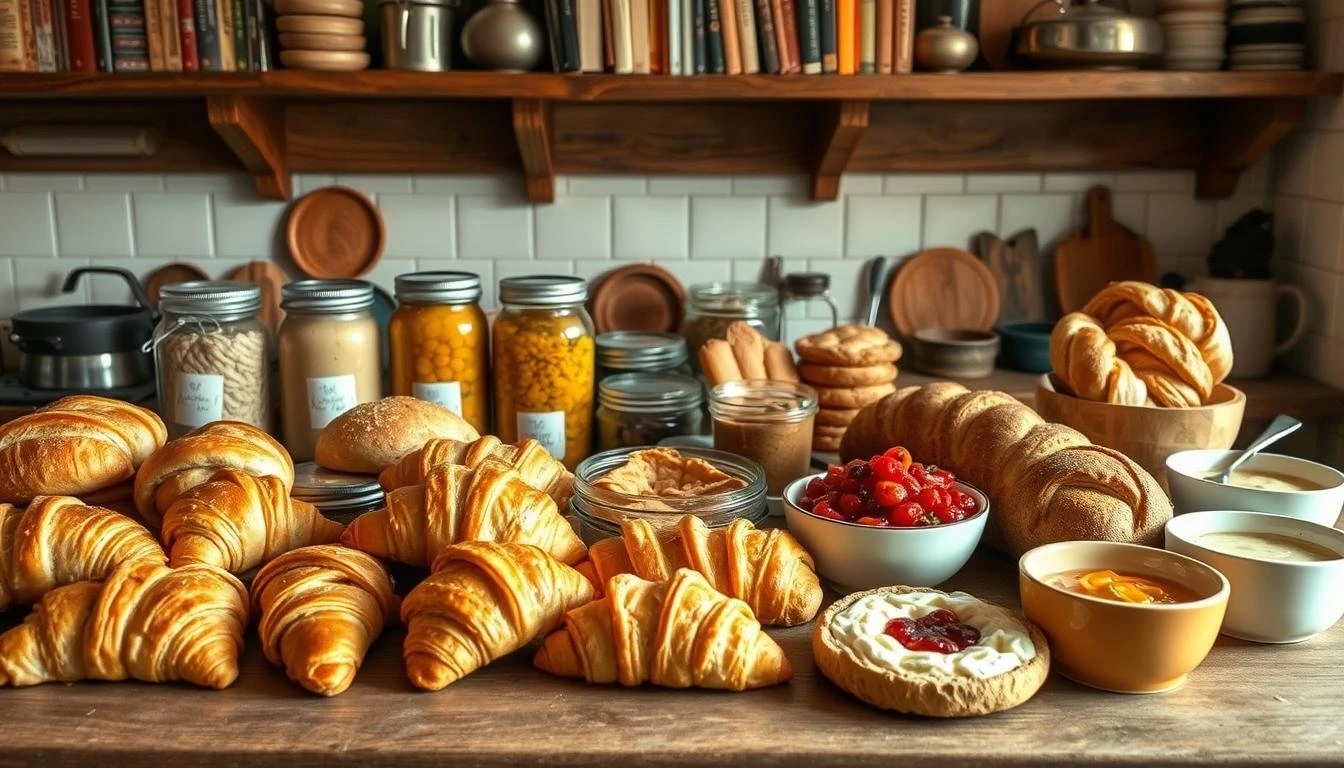My kitchen journey started with a simple sourdough starter on my counter. It turned into a fun cooking adventure during the pandemic. This changed how I bake and cook.
Sourdough is more than just bread. Your starter can make many tasty dishes beyond bread. Try making crispy crackers or fluffy pancakes. These recipes will amaze you and are good for your health.
The secret of sourdough is its fermentation. It breaks down bad stuff, cuts gluten, and adds good bacteria. It’s great for reducing waste and trying new recipes.
In this guide, we’ll show you five cool Sourdough Recipes Not Bread. They’ll change how you see this fermented mix. Get ready to learn new cooking skills and see your sourdough starter in a new light!
Table of Contents
Sourdough Pancakes
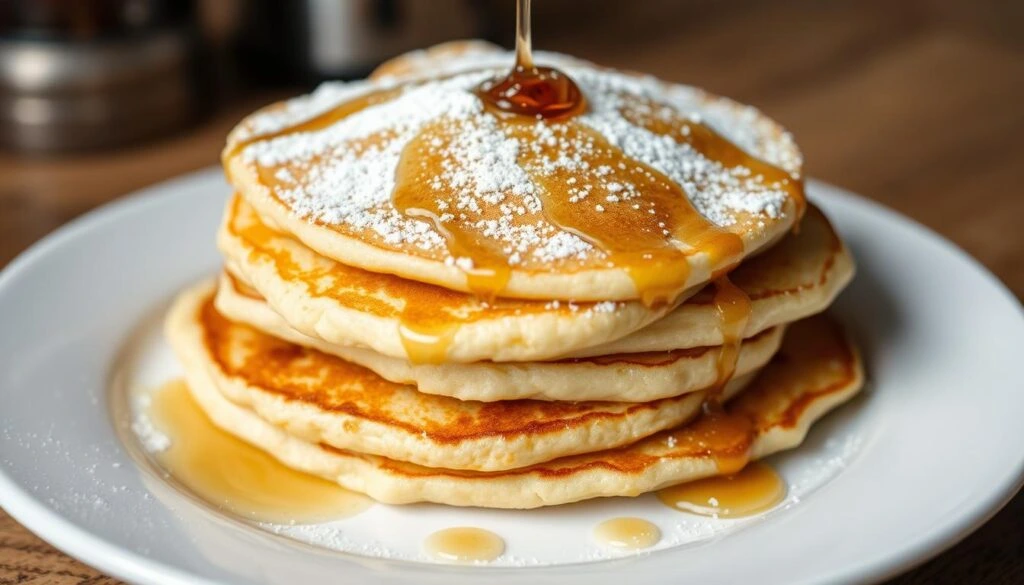
Make your weekend breakfast special with sourdough pancakes. They’re a tasty way to use up sourdough discard. These pancakes add a tangy twist to your morning, making it both healthy and yummy.
Sourdough pancakes offer a unique taste experience. They use your sourdough starter, adding flavor and health benefits to your breakfast.
Pancake Preparation Essentials
- Prep time: Less than 10 minutes
- Required sourdough discard: 1 cup
- Flour needed: 1.5 cups all-purpose flour
- Recommended starter hydration: 100% for optimal fluffiness
The secret to sourdough pancakes is in their prep. Fermentation is key. Letting the batter rest overnight enhances flavors and makes them easier to digest. This process breaks down carbs, making the pancakes better for your stomach.
Nutritional Breakdown
Each sourdough pancake is a nutritional powerhouse:
- Calories: 291 per pancake
- Protein: 6g
- Carbohydrates: 33g
- Fat: 16g
Cooking these pancakes is easy. Use medium-low heat and cook for 1-2 minutes on each side. They’re done when bubbles appear on the surface. Top with fresh fruits, maple syrup, or your favorite toppings for a memorable breakfast.
Pro tip: Freeze extra pancakes for up to a few months. Lay them flat on a baking sheet before freezing in a bag. This keeps them from sticking together and makes for a quick breakfast on busy days.
Sourdough Pizza Crust
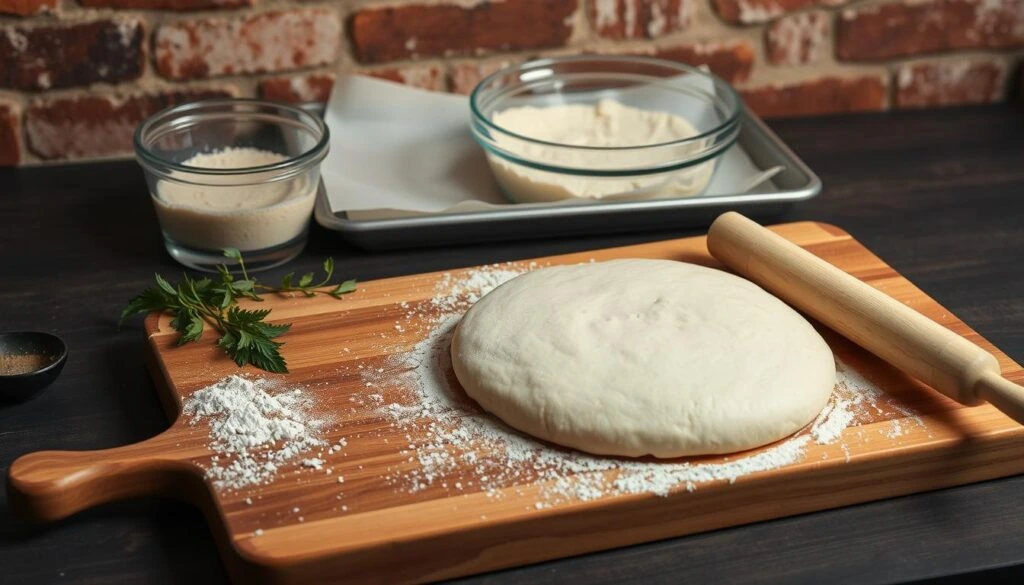
Making a sourdough pizza crust turns your kitchen into a gourmet spot. Your sourdough starter is the key to a pizza base that makes every bite special.
To make a great sourdough pizza crust, you need to know a few tricks. The secret is in the fermentation. It brings out deep flavors and the perfect texture.
Essential Ingredients and Proportions
- Active sourdough starter
- High-protein bread flour
- Filtered water
- Sea salt
- Olive oil
For the perfect hydration, use 75% water to flour. So, for 500g flour, add about 375g water. This mix makes the dough elastic and just right.
| Fermentation Stage | Time Required |
|---|---|
| Initial Rise | 6-12 hours |
| Refrigeration | 6-72 hours |
| Room Temperature Rest | 1 hour |
Patience is key for a top-notch sourdough pizza crust. Do 4 stretch and fold during fermentation. This builds gluten strength. Your dough should double in size, creating air pockets for a light, crispy crust.
To bake, heat your oven to 450°F. A Baking Steel can help you get restaurant-quality results. It spreads heat better than a pizza stone.
Sourdough Crackers
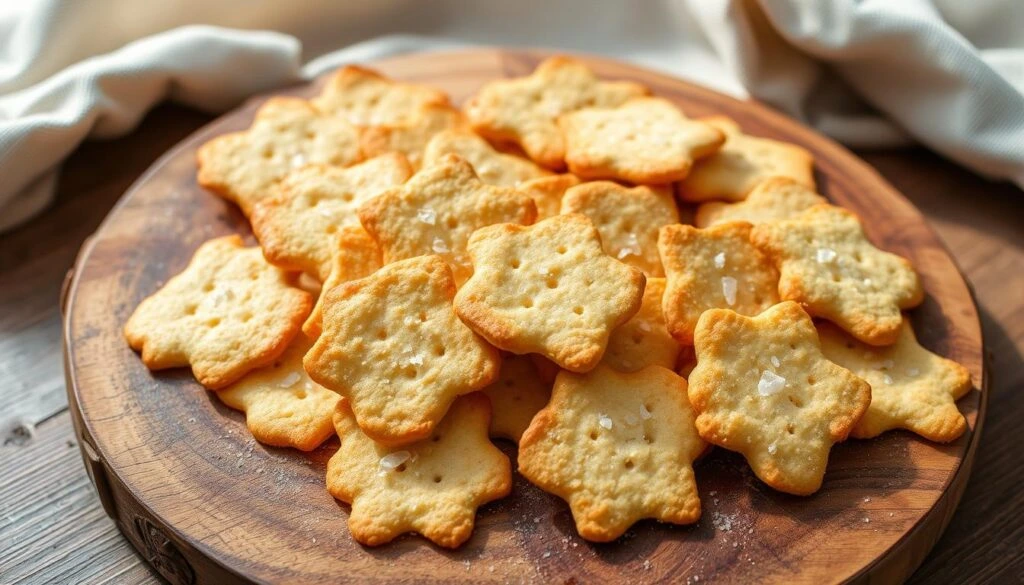
Turning sourdough discard into crispy crackers is a great way to cut down on waste. It also makes a tasty snack. Sourdough crackers are better than store-bought ones because they offer a satisfying crunch.
Making sourdough crackers is easy and lets you try different flavors. Here’s why they’re so great:
- Nutritionally enhanced through fermentation
- Crisp texture with deep, tangy flavor
- Versatile serving options
- Easy to prepare with minimal ingredients
To make sourdough crackers, you need just a few things:
- 1 cup sourdough starter discard
- 1/2 cup all-purpose flour
- 2 tablespoons olive oil
- 1 teaspoon salt
- Optional seasonings
Roll the dough extremely thin – about 1/16 inch thick – for the best crunch. Bake at 350°F for about 25 minutes until they’re golden and crunchy. They’ll stay fresh for up to 5 days in an airtight container.
These crackers are great with cheese, hummus, or on their own. Making sourdough discard into crackers is a tasty and cost-effective idea.
Sourdough Waffles
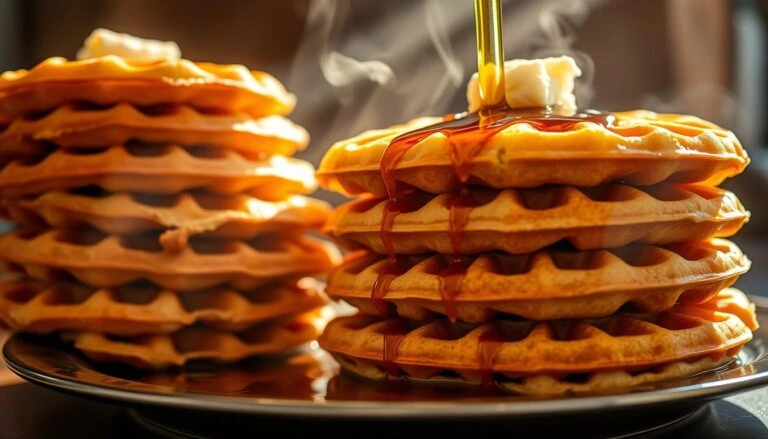
Make your breakfast special with sourdough waffles. They mix tangy taste with crispy texture. It’s a fun way to use your sourdough starter and start the day right.
Key Ingredients for Perfect Sourdough Waffles
- ¾ cup sourdough starter discard
- 2 cups all-purpose flour
- 1 cup buttermilk
- 3 tablespoons sugar
- 4 tablespoons melted butter
- 2 large eggs
- 1 teaspoon baking soda
- 1 teaspoon baking powder
- 1 teaspoon fine sea salt
Using an active sourdough starter is key. It makes the waffles taste complex and tangy. This is what makes them different from regular waffles.
Nutritional Breakdown
| Nutritional Value | Per Waffle |
|---|---|
| Calories | 152 kcal |
| Carbohydrates | 22 g |
| Protein | 4 g |
| Total Fat | 6 g |
Cooking sourdough waffles is simple and fast. It takes only 20 minutes to prepare, and 3-6 minutes to cook each waffle. You’ll get 10 tasty waffles that keep well in the fridge for 7 days or in the freezer for 3 months.
Reheat your waffles in a toaster oven at 375°F for 10-15 minutes. This keeps them crispy. Top them with your favorite ingredients for a nutritious and delicious breakfast!
Sourdough English Muffins
Discover the magic of homemade sourdough English muffins. They change your breakfast routine. These delightful rounds offer a unique twist on traditional breakfast fare.
Making sourdough English muffins needs precision and patience. Your sourdough starter is key for the tangy flavor and tender texture. The process involves several steps that make these muffins special.
Key Ingredients and Preparation
- Active sourdough starter (½ cup)
- All-purpose flour (3 cups)
- Water and milk
- Honey or sugar
- Salt
Your sourdough starter must be fed 12 hours before mixing. The dough needs 8-12 hours to rise at room temperature. This allows complex flavors to develop. Make the muffins about ½ inch thick and 3 inches in diameter.
Cooking Techniques
Cooking sourdough English muffins requires careful attention. Use a cast iron skillet and cook each side for about 4 minutes. Aim for a crispy exterior and a soft, airy interior.
| Nutrition Facts | Per Muffin |
|---|---|
| Calories | 161 kcal |
| Carbohydrates | 32 g |
| Protein | 5 g |
| Fat | 1 g |
One exciting thing about sourdough English muffins is their versatility. Enjoy them toasted with butter, use as a base for eggs Benedict, or create delicious breakfast sandwiches. They keep up to 5 days at room temperature and can be frozen for up to 3 months.
Pro tip: Each batch makes 12 muffins, great for meal prepping or sharing. The fermentation process enhances flavor and improves digestibility compared to store-bought versions.
See more : 3 Secrets to Perfect Pancakes with a Pancake Mix Recipe Without Baking Powder
Delicious pancake recipe without baking powder
Conclusion : Sourdough Recipes Not Bread
Your sourdough journey doesn’t stop at making bread. The sourdough discard recipes we’ve explored show amazing culinary versatility. They turn your starter into something truly special.
From crispy crackers to fluffy pancakes, these recipes show your starter’s incredible potential. They prove it can be a game-changer in your kitchen.
Exploring sourdough recipes beyond bread opens up a world of tasty possibilities. These methods not only cut down on food waste but also offer healthier, easier-to-digest options. Your sourdough starter becomes a key tool for making nutritious, tasty dishes.
Each recipe we’ve talked about offers a unique way to use your sourdough discard. This means nothing goes to waste. Whether you’re an experienced baker or just starting, these creative ideas invite you to try new things. They let you see the rich potential of your starter in ways you might never have thought of.
Remember, sourdough is more than just baking. It’s a culinary art that connects you to traditional cooking while allowing endless creativity. Your starter is alive and full of potential, ready to make ordinary meals into something truly special.
FAQ
What is a sourdough starter, and how do I create one?
How can I use sourdough discard in recipes?
Are sourdough recipes healthier than traditional baked goods?
How long can I store a sourdough starter?
Can I make gluten-free sourdough recipes?
What equipment do I need to make sourdough recipes?
How can I troubleshoot a weak or inactive sourdough starter?
Have You Tried Our Recipe?
There are no reviews yet. Be the first one to write one.

